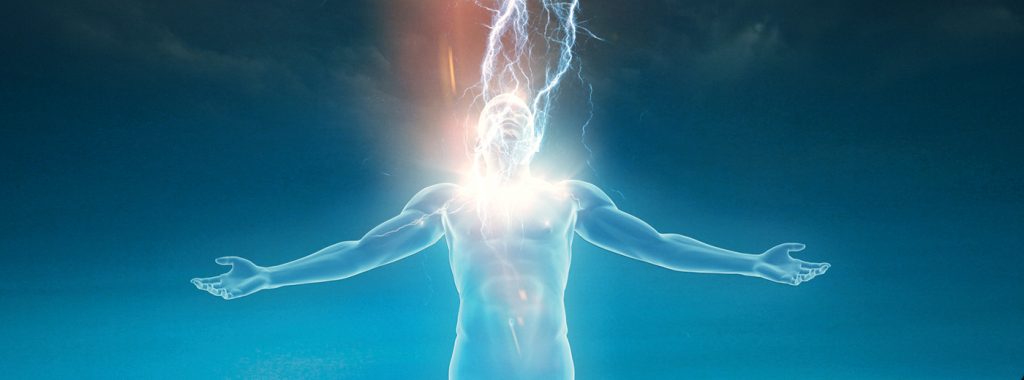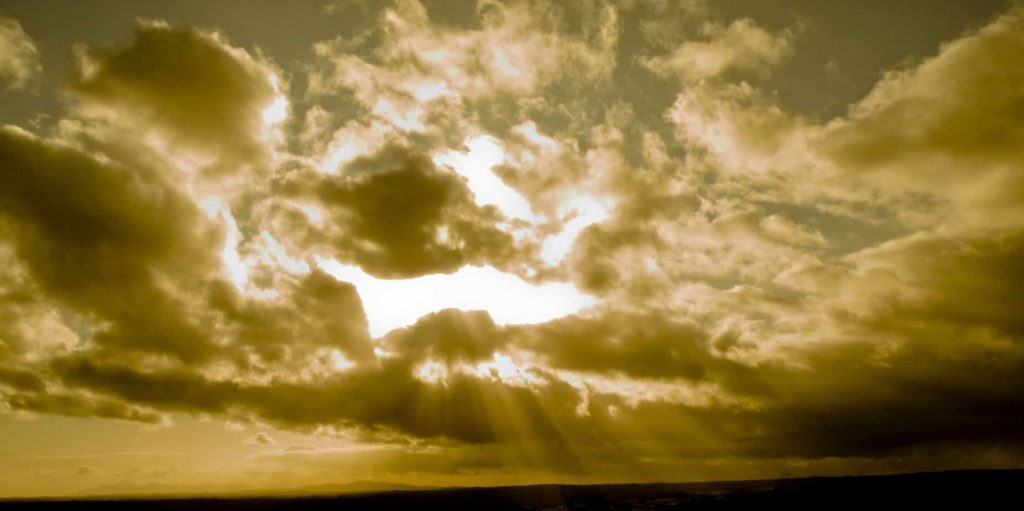Yesterday evening, in a local cigar shop, there was a conversation held about belief in God. I use the capital “G” there for God, because the conversation started out about whether or not one man’s son believed in God. It quickly morphed into a discussion about the difference between “belief in God,” and “belief in deity.” Like most conversations it eventually morphed into something else (mostly because a lot of people are uncomfortable discussing religion) but it was on my mind as I drove home. As I drove I realized how much I take on faith each day, and how much of that isn’t related to any religion at all. And the realization I’ve had before was reinforced again: “having faith” and “believing in a deity” is such a vast spread of shades of gray that I fail to comprehend how anyone can say they have NO faith.
Let’s get a few terms out of the way so we can all be on the same page. As defined by dictionary.com:
Faith: confidence or trust in a person or thing; belief that is not based on proof; belief in God or in the doctrines or teachings of religion; belief in anything, as a code of ethics, standards of merit, etc.; a system of religious belief; the obligation of loyalty or fidelity to a person, promise, engagement, etc.; the observance of this obligation; fidelity to one’s promise, oath, allegiance, etc.
Deity: a god or goddess; divine character or nature, especially that of the Supreme Being; divinity; the estate or rank of a god; a person or thing revered as a god or goddess; God; Supreme Being.
Because dictionary.com defines only single words, I had to look elsewhere to get a decent description of “higher power” (because I was trying my best not to put my personal definition into the mix). So, according to Wikipedia:
Higher power: is a term used in the 1930s in Alcoholics Anonymous (AA) and is used in other twelve-step programs. It is also sometimes referred to as a power greater than ourselves and is frequently abbreviated to HP. The term sometimes refers to a supreme being or deity, or other conceptions of God.

Let’s start out with “Faith” and the part that says, “confidence or trust in a person or thing.” This was what struck me last evening as I drove home across a very tall two-lane bridge. It occurred to me that thousands of people regularly drive across that bridge and take a few things on faith. They take on faith that the bridge won’t collapse. They take on faith that the other drivers won’t cross the double yellow line and hit them head on.
Both of those things HAVE been proven, so there may be a reduced measure of faith required, BUT… accidents have happened on that bridge wherein a driver DOES cross the double yellow line and hits an oncoming driver head on. That is HAS happened proves it can happen, so faith is required to believe it WON’T happen on this bridge crossing. The bridge hasn’t collapsed… YET. Other bridges, which have similar years of construction, similar construction materials, regular inspections and maintenance, just like this one… other bridges HAVE collapsed and people have died. That the bridge wont’ collapse during THIS crossing takes a measure of faith, no matter how small.
People drive across that bridge every day, sometimes several times per day, mostly because not crossing the bridge means adding an hour or more to their drive and it’s been good to go so far. Still, for all that: as I articulated above – crossing that bridge requires a measure of faith, and therefore, by driving across that bridge, a person is demonstrating his or her faith (in the bridge and fellow drivers).
They don’t really have a choice. They have faith that the bridge won’t collapse; that they won’t get hit by another driver; that the bridge inspectors know what they’re doing and do it right; that the maintenance engineers and workers know what they’re doing and do it right. So much faith… so regularly ignored or taken for granted.
This application of the use of the term “faith” can be spread out to an awful lot of things in our day to day life. We have faith that the alarm clock will go off. We have faith the coffee maker will work. We have faith our car will start. We have faith that the building(s) we work in won’t collapse. We have faith that the sun will shine and… Wait. The sun shining is a bit different, isn’t it? It’s a part of the natural world and would be there even if mankind didn’t exist. It’s not part of what we construct and have faith in. It’s above us, so to speak. Its place in the universe doesn’t have anything to do with whether or not we believe in it, accept it, whatever. It simply is. And that existence beyond our impact is part of the reason why some people used to worship it or consider it some kind of deity (some may still for all I know).

So let’s use the sun as our transition to discuss the term “higher power.” Although the sun may not directly control my day to day activities, the interaction of it with the earth’s environmental conditions in my area DOES. In this way, nature – a higher power (a power greater than ourselves) – impacts our lives. The impact can be perceived as positive or negative and that changes with the conditions created. But most of us, if we ever give it any thought, take for granted (have faith) that the sun will rise in the morning. Essentially that means we have faith that the earth will continue to rotate and will continue to orbit the sun in the pattern measured and delineated as far back in time as man has been able to document or recognize it.
If you carefully reread the paragraphs above, you’ll see that we’ve demonstrated: virtually every human being has faith in something, and every human being recognizes a higher power. After all, if you’re in denial about the sun (or gravity, or environment, etc) then you aren’t rational and having a discussion with you renders everything moot.
 What about that last term: Deity? The definition of “deity” keeps referring to the word, or some version thereof, “god,” so I decided to look that up as well. Dictionary.com lists 8 different definitions for it and #7 is: any deified person or object. Hmm… if you deify something then you are treating it as a deity. Being deity means it is some type of god, or similar thereto. By definition, if you believe in the deity of something it is, by default, your god. If deity is also a higher power, a power greater than ourselves, then the terms “deity” and “higher power” can be properly applied to a great many things.
What about that last term: Deity? The definition of “deity” keeps referring to the word, or some version thereof, “god,” so I decided to look that up as well. Dictionary.com lists 8 different definitions for it and #7 is: any deified person or object. Hmm… if you deify something then you are treating it as a deity. Being deity means it is some type of god, or similar thereto. By definition, if you believe in the deity of something it is, by default, your god. If deity is also a higher power, a power greater than ourselves, then the terms “deity” and “higher power” can be properly applied to a great many things.
Go for a walk in the woods. Pick a state park; any state park. Take a look around. SEE nature. The majestic mountains, waving wheat fields, rumbling rivers and the sounds of wildlife all around you. Recognize that ALL of that is part of nature, as is every part of Earth’s environment and the sun as our planet interacts with it. “Nature” is certainly something greater than ourselves. If you recognize and appreciate it, even if you don’t worship nature (although there is a religion that does), then take the next step and recognize that you have faith it is never-ending; enduring. Recognize that it has an impact on your day to day life that you cannot control; you can only react to. Through all of this reasoning and recognition, if you think about it, you have deified the natural world around us and you have faith in that deity.
Then if someone asks you, “Do you believe in god?” How can you honestly say, “No”? The answer to that question depends on whether you think that questioner specifically means the Christian deity and is using “god” with a capital “G.” Let’s change the question and ask it this way: Do you believe in ANY god?”
Now I need to define two other terms, again thanks to dictionary.com:
Atheist: a person who denies or disbelieves the existence of a supreme being or beings.
Agnostic: a person who holds that the existence of the ultimate cause, as God, and the essential nature of things are unknown and unknowable, or that human knowledge is limited to experience.
Experience has shown that if you ask a person, “Do you believe in any god?” and they answer, “No,” then you can ask the follow on question, “Are you an atheist or agnostic?” and not get a clear answer. Many will answer, “Atheist,” thinking that it means that they don’t believe in any higher power whatsoever, when in reality it applies only to “supreme being or beings.” In other words, they may not believe in God, but that doesn’t mean they don’t believe in a higher power. Some will answer “Agnostic” thinking that means they don’t believe in God, but what it actually means is that they recognize it’s impossible to know everything about God and, as a result, don’t claim to believe in God; they claim not to have faith.
Reread the definitions. It doesn’t matter if you’re atheist or agnostic. It doesn’t matter if you profess a belief in God, Allah, Yahweh or any other named deity. It doesn’t matter if you feel you’re not religious or that you only experience religion as based on what you’ve experienced firsthand in your life. When asked if you believe in a deity, I argue that, based on the discussion above, everyone has to honestly answer yes. Whether or not that deity gives you guidance on how to live your life is entirely up to your interpretation of your relationship with the deity identified.
But everyone has faith in something. That is undeniable… unless you simply like to argue (and I have faith that some readers do.)

One Reply to “Recognizing Faith Without Argument”